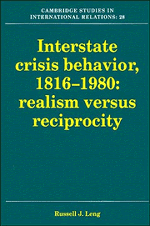Book contents
- Frontmatter
- Contents
- List of figures
- List of tables
- Preface
- 1 REALIST AND PSYCHOLOGICAL PERSPECTIVES
- 2 METHODOLOGY
- 3 THE CRISIS STRUCTURE AND WAR
- 4 PATTERNS OF BEHAVIOR
- 5 STRUCTURE, BEHAVIOR, AND OUTCOMES
- 6 INFLUENCE TACTICS
- 7 INFLUENCE STRATEGIES
- 8 RECIPROCATING INFLUENCE STRATEGIES
- 9 SUMMARY AND CONCLUSION
- EPILOGUE: THE 1990–1991 CRISIS IN THE PERSIAN GULF
- Appendices
- Notes
- References
- Index of names
- Index of subjects
- Titles in the series
4 - PATTERNS OF BEHAVIOR
Published online by Cambridge University Press: 05 February 2010
- Frontmatter
- Contents
- List of figures
- List of tables
- Preface
- 1 REALIST AND PSYCHOLOGICAL PERSPECTIVES
- 2 METHODOLOGY
- 3 THE CRISIS STRUCTURE AND WAR
- 4 PATTERNS OF BEHAVIOR
- 5 STRUCTURE, BEHAVIOR, AND OUTCOMES
- 6 INFLUENCE TACTICS
- 7 INFLUENCE STRATEGIES
- 8 RECIPROCATING INFLUENCE STRATEGIES
- 9 SUMMARY AND CONCLUSION
- EPILOGUE: THE 1990–1991 CRISIS IN THE PERSIAN GULF
- Appendices
- Notes
- References
- Index of names
- Index of subjects
- Titles in the series
Summary
As his narrative account of the diplomatic confrontation at the Congress of Vienna approached a climax, Harold Nicolson (1946:166) paused to warn the reader of the dangers of over-rationalizing events in their reconstruction: “The structure of an international crisis is organic rather than artificial; however much one may seek to detach and mount the specimens for purposes of exposition, it must never be forgotten that at the time they were part of the thought, feeling and action of sentient human beings, exposed to all the impulses and fallibility of human nature.”
Nicolson's warning is worth bearing in mind as we begin this chapter, for we will be embarking on an investigation that begins with an effort in taxonomy: the classification of crises by behavioral types. The underlying assumption in such an undertaking is that, however much human feeling and thought may influence the direction of a crisis, it can be classified as a distinct behavioral type that shares features in common with a number of similar episodes involving different policy-makers from different states in different diplomatic eras.
There are two behavioral dimensions of particular interest to our study: (1) the degree of escalation in the mix of cooperative and conflictive behavior of each side, and (2) the degree of reciprocity exhibited in the interactions of the participants. These two dimensions are chosen because discussions of patterns of escalation and reciprocity have played such a prominent role in the critique of the prescriptions of conflict strategists. If those critiques are correct, we should find some evidence of their validity in the relationship between crisis outcomes and patterns of escalation and reciprocity in the behavior of the participants.
- Type
- Chapter
- Information
- Interstate Crisis Behavior, 1816–1980 , pp. 66 - 90Publisher: Cambridge University PressPrint publication year: 1993



